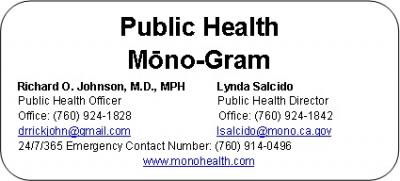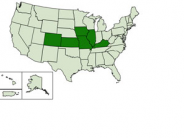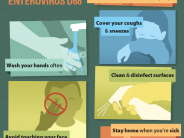Mono-Gram - Serious Respiratory Disease Risk in Kids 9/15/14
Monday, Sep 15, 2014
Serious Respiratory Disease Risk in Kids
Key Points:
- From mid-August to September 12, 2014, a total of 97 people in six states have been confirmed to have respiratory illness caused by a virus known as EV-D68. Some children have required admission to pediatric intensive care units (PICU). Most hospitalized patients are less than five years of age, although some have been adolescents, and most have a history of asthma. So far, no deaths attributed to EV-D68 infection have been documented.
- In August 2014, two Missouri and Illinois hospitals had higher numbers of children with severe respiratory illness caused by EV-D68 than usual for this time of year. Many of these children had asthma. Most had difficulty breathing; some had wheezing. 17 other states are investigating whether similar increases exist in their hospitals, and have submitted specimens to the Centers for Disease Control (CDC) for testing. No cases have been documented in California as of Friday Sep 12th, but clusters are being investigated in various places on the west coast.
- We understand that the public may be concerned about this situation. Severe respiratory illness is always a concern to us, especially when infants and children are affected. We will share information as soon as we have it.
- The general public can help protect themselves from respiratory illnesses by washing hands with soap and water, avoiding close contact with sick people, and disinfecting frequently touched surfaces.
Background
-Enteroviruses
- Enteroviruses are very common viruses; there are more than 100 types.
- It is estimated that 10 to 15 million enterovirus infections occur in the United States each year.
- Enteroviruses can cause respiratory illness, febrile rash, and neurologic illnesses, such as aseptic meningitis (swelling of the tissue covering the brain and spinal cord) and encephalitis (swelling of the brain).
- Most infected people have no symptoms or only mild symptoms, but some infections can be serious.
- Infants, children, and teenagers are most likely to get infected with enteroviruses and become sick. Adults can get infected with enteroviruses, but they are more likely to have no symptoms or mild symptoms.
- In general, the spread of enteroviruses is often quite unpredictable, and different types of enteroviruses can be common in different years with no particular pattern. In the United States, people are more likely to get infected with enteroviruses in the summer and fall.
-Enterovirus D68
- Enterovirus D68 (EV-D68) infections are thought to occur less often than infections with other enteroviruses.
- EV-D68 was first identified in California in 1962. Compared with other enteroviruses, EV-D68 has been rarely reported in the United States. However, EV-D68, like other enteroviruses, is likely to be found in many places in the United States during this time of the year.
-Symptoms
EV-D68 has been reported to cause mild to severe respiratory illness.
- Mild symptoms may include fever, runny nose, sneezing, cough, body and muscle aches.
- Most of the children who got very ill with EV-D68 infection in Missouri and Illinois had difficulty breathing, and some had wheezing. Many of these children had asthma or history of wheezing.
-People are risk
- In general, infants, children, and teenagers are most likely to get infected with enteroviruses and become ill. That's because they do not yet have immunity, or protection, from previous exposures to these viruses. We believe this is also true for EV-D68.
- Among the EV-D68 cases in Missouri and Illinois, children with asthma seemed to have a higher risk for severe respiratory illness.
-Transmission
- EV-D68 is not frequently identified, so it is less studied and the ways it spreads are not well-understood. Since EV-D68 causes respiratory illness, the virus can be found in respiratory secretions, such as saliva, nasal mucus, or sputum. The virus likely spreads from person to person when an infected person coughs, sneezes, or touches contaminated surfaces.
-Treatment
There is no specific treatment for people with respiratory illness caused by EV-D68 infection.
- For mild respiratory illness, you can help relieve symptoms by taking over-the-counter medications for pain and fever. Aspirin should not be given to children.
- Some people with severe respiratory illness caused by EV-D68 may need to be hospitalized and receive intensive supportive therapy.
-There are no antiviral medications are currently available for people who become infected with EV-D68.
-Prevention
- There are no vaccines for preventing EV-D68 infections.
- You can help protect yourself from respiratory illnesses by following these steps:
- Wash hands often with soap and water for 20 seconds, especially after changing diapers
- Avoid touching eyes, nose and mouth with unwashed hands
- Avoid kissing, hugging, and sharing cups or eating utensils with people who are sick
- Disinfect frequently touched surfaces, such as toys and doorknobs, especially if someone is sick
- Since people with asthma are at higher risk for respiratory illnesses, they should regularly take medicines and follow guidance to maintain control of their illness during this time. They should also take advantage of influenza vaccine when available since people with asthma have a difficult time with respiratory illnesses.




